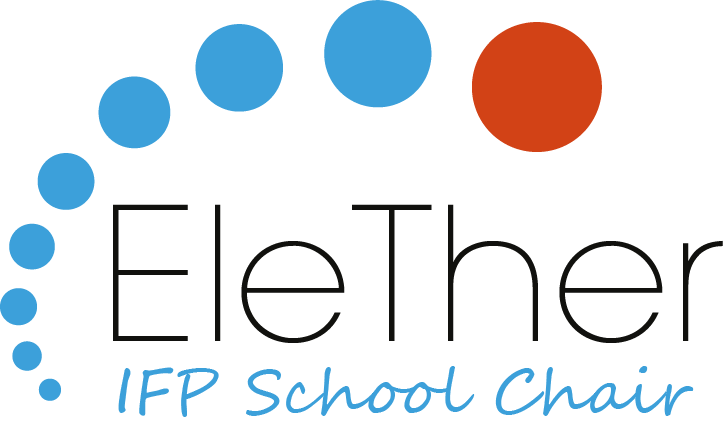
Presentation
The acronym EleTher stands for Electrolyte Thermodynamics.
The EleTher Chair is supported by the Association de Formation pour l’Industrie (AFI), one of the School’s historical partners. Approved by the AFI Board of Directors on the 2nd of March, 2021, the Chair is established at IFP School’s Processes for Energy and Chemicals Center.
With the launch of this new chair, IFP School aims to accelerate research on the thermodynamics properties of aqueous waste containing metals, acids and bases, and organic solvents for the circular economy.
Context
One of the objectives of the French Law on circular economy is to promote recycling of waste products in order to reduce the environmental impact of these materials.

To meet this objective, recycling processes are developed to turn waste into new resources. Many efforts are currently focusing on the recycling of plastics, but other waste products are being produced as part of the ecological transition, such as batteries or catalysts.
The challenge when recycling is being able to determine exactly what are the materials contained in each batch provided. Indeed, with a circular economy each batch may come from different sources, different sorting, collection and treatment channels. Recycling also requires a lot of water. However, little data exists today on these complex electrolytic mixtures.
Industrialists need thermodynamic models that will allow them to reliably predict the properties and phase equilibria of these fluids. Considering the cost of data, it is key to be able to obtain accurate results with the least amount of data, so that the appropriate treatment processes can be designed with a high level of confidence.
There is a strong need for in-depth scientific knowledge as well as new skills in the field of electrolyte thermodynamics. The work is vast and the efficiency of the research carried out will be increased if scientists work together.
The EleTher Chair is part of this effort and benefits from work already carried out by IFP Energies nouvelles (IFPEN). The holder of the chair leads a group of industrialists around a joint industry project (JIP) made of up seven partners. He also takes part in the work of a European research consortium in partnership with three renowned universities in this field.
Research areas "Electrolyte thermodynamic modelling for circular economy"
For the period 2021-2023, the deliverables for the Chair will derive from the work of two theses, post-docs and internships.
The work will contribute to improve modelling tools for electrolytic systems to be used in the context of the circular economy. The research has four objectives:
- to understand the observed phenomena through an analysis of experimental data;
- to understand fundamental physics at the origin of the interactions between species by using atomistic models;
- to develop macroscopic tools (equations of state) that can be used in process simulations;
- to evaluate the sensitivity of simulations with respect to the data used.
Current models do not allow us to correctly predict the correct concentrations of ionic species in mixed solvents or at high temperatures; this is the focus of the first thesis entitled: "Analysis of electrolyte solvation within the primitive equation of state framework". A second thesis will be launched at the end of 2021 to extend the subject to organic electrolyte molecules.
Training, education and outreach: the three cornerstones of the Chair
The EleTher Chair aims to develop:
- Training: to contribute to the training and to inspire a new generation of international researchers and experts in the field of electrolytes thermodynamics.
- Education: In addition to the research work, the Chair ensures the liaison between research and teaching activities at IFP School, in particular in the Energy and Processes, Processes and Polymers programs and the research-oriented Catalysis and Processes master’s degree, offered by the Université de Lille and co-accredited by Centrale Lille and IFP School. Indeed, the work will allow the development of thermodynamic modules for IFP School students, who are set to become key actors of the ecological transition and are concerned with the development of a circular economy.
- Outreach: to make research results and teaching tools available to the EleTher joint industry project and the partners of the Chair. An active presence in the "Thermodynamics and Transport Properties" working group of the European Federation of Chemical Engineering (EFCE) also contributes to raise the community’s awareness on this subject.
? Learn about the applications of thermodynamics to the circular economy: https://pubs.acs.org/doi/10.1021/acs.iecr.2c01906.
? The IFP School applied thermodynamics teaching unit has a web page with e-learning material and a specific web-based tool for helping select thermodynamic models.
Events
- Get information on events in 2023
- "Sebastian Roa Pinto's thesis defense, September 22, 2022: "Predictive thermodynamic model for complex electrolytic systems"
- "Thermodynamic equilibrium calculations for hydrometallurgical processes": webinar on November 18, 2021
Check out the program and read the presentations
- "Electrolyte thermodynamics challenges from industrial needs to academic research"
On May 19, 2021, the European Federation of Chemical Engineering (EFCE) organized with the support of the Joint industry project EleTher, a webinar around the scientific developments in the field of electrolyte thermodynamics, both from the academic and industrial point of view. Jean-Charles de Hemptinne covered the industrial part, while Georgios M. Kontogeogis (University of Denmark) presented the academic part.
The event, which welcomed nearly 80 participants, can be viewed on YouTube.
Publications
- "A view on the future of Applied Thermodynamics" co-written by Jean-Charles de Hemptinne, Georgios M. Kontogeorgis, Ralf Dohrn, Ioannis G. Economou, Antoon ten Kate, Susanna Kuitunen, Ljudmila Fele Žilnik, Maria Grazia De Angelis and Velisa Vesovic.
Holder of the Chair
Jean-Charles de Hemptinne, a teacher and a researcher at IFP School
The Chair's Steering committee
- Christine Travers, Dean of IFP School
- Pascal Mougin, Head of the Thermodynamic and Molecular Simulation department, IFPEN
- Thierry Bécue, Director of the Applied Physical Chemistry and Mechanics Division, IFPEN
- Laetitia Salessy, Director of IFP School’s Processes for Energy and Chemicals Center
- Raymond Bulle, President of AFI
- Prof. Georgios Kontogeorgis, DTU
- Thomas Gerlach, Bayer
Doctoral and post-doctoral offers
Thesis offers are available here.
***
? Get all information about the Electrolyte Thermodynamics Joint Industry Project (JIP)